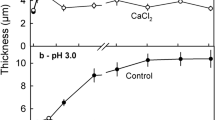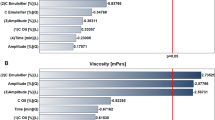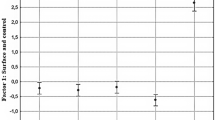Abstract
SURFACE monomolecular films of cetyl alcohol (CH3(CH2)14CH2OH) have been shown to reduce losses by evaporation from open water surfaces1, and this application has had some successful use in Australia2. There recently appeared a report3 that the mixing of cetyl alcohol with the soil in which corn (Zea mays) plants were growing reduced their loss of water by transpiration by 40 per cent without reducing yield. If it was confirmed that some substance could be taken up by plants which reduced their water needs without impairing growth, such a finding would have great potential agricultural importance. It was therefore decided to repeat Roberts's experiment on a pot scale, measuring the effects of cetyl alcohol on growth, transpiration rate and photosynthetic capacity.
This is a preview of subscription content, access via your institution
Access options
Subscribe to this journal
Receive 51 print issues and online access
$199.00 per year
only $3.90 per issue
Buy this article
- Purchase on Springer Link
- Instant access to full article PDF
Prices may be subject to local taxes which are calculated during checkout
Similar content being viewed by others
References
Langmuir, I., and Langmuir, D. B., J. Phys. Chem., 31, 1719 (1927).
Mansfield, W. W., Nature, 175, 247 (1955).
Roberts, W. J., J. Geophys. Res., 66, 3309 (1961).
Author information
Authors and Affiliations
Rights and permissions
About this article
Cite this article
NEALES, T., KRIEDEMAN, P. Reduction of Plant Transpiration by Cetyl Alcohol. Nature 195, 1221–1222 (1962). https://doi.org/10.1038/1951221a0
Issue Date:
DOI: https://doi.org/10.1038/1951221a0
This article is cited by
Comments
By submitting a comment you agree to abide by our Terms and Community Guidelines. If you find something abusive or that does not comply with our terms or guidelines please flag it as inappropriate.



